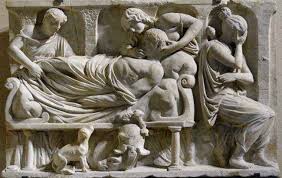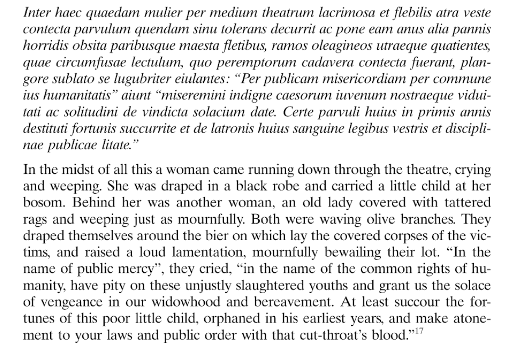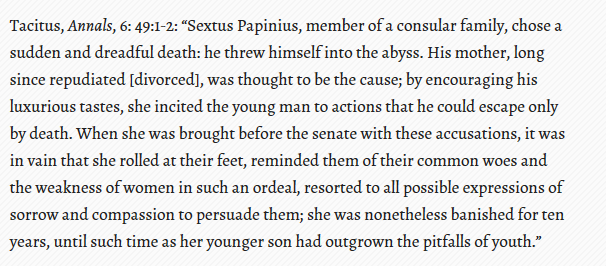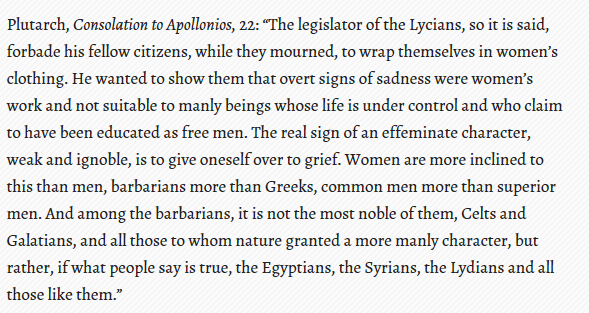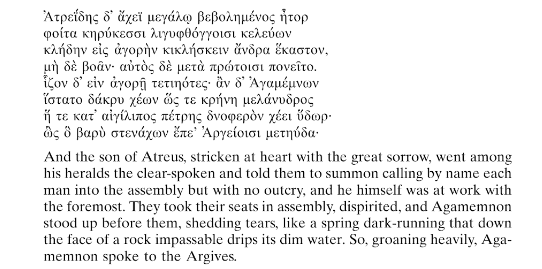Lets do the Lindy and weeping thread.
There is a modern conception of what a man should be, call it masculinity, that said men should never cry. This is wrong. Lindy says man can and should cry. However
men and women did not necessarily cry in the same circumstances.
There is a modern conception of what a man should be, call it masculinity, that said men should never cry. This is wrong. Lindy says man can and should cry. However
men and women did not necessarily cry in the same circumstances.
In funeral rituals, women are the principal source of lamentations. Women and their tears were important at funerals, and still are today. Professional mourners were sometimes used throughout history. Always women.
Weeping at funerals is Lindy for women
https://en.wikipedia.org/wiki/Professional_mourning
Weeping at funerals is Lindy for women
https://en.wikipedia.org/wiki/Professional_mourning
Suppliciato: Performing the rituals of supplications the civitas tried to counter crises such as natural catastrophes, epidemics or military defeats. The senate, the consuls or the priests would order citizens to visit the temples in order to move the gods to lend their aids....
In sanctuaries and temples they would pray to appease the gods, they would usually offer some wine or incense. Tears were a positive force. You see this in the Bible. Samuel 1:2. Even today women ask for things in prayer and if they mean it they Cry
https://en.wikipedia.org/wiki/Supplicatio
https://en.wikipedia.org/wiki/Supplicatio
Tears shed in judicial settings show distinctions between the sexes. Despondent weeping accompanied on occasion by a call for vengeance. This was common. Call for revenge if the departed had been murdered. Apuleius in Metamorphoses describes a fake lamentation and the cry...
for revenge upon the "murderer" Lucius. After Lucius had been accused of murder and had presented his defense, two women step forward and wailed.
They demand justice for murder, demand blood in revenge from the judges and magistrates of the city who admit the validity of their demands. The end of the story ends with wineskins instead of dead bodies and the city was playing a trick on poor Lucius....
The episode ends in laughter instead of torture and death with which Lucius had been threatened. Apuleius describes the episode conforming to the norm to which widowed roman women were expected to act. Women wept to move men in authority to avenge them
Of course a woman's tears in court also brought suspicion that it was inauthentic and performative.
Even today art addresses this concern about a woman's tears in the courtroom https://genius.com/Common-testify-lyrics
Even today art addresses this concern about a woman's tears in the courtroom https://genius.com/Common-testify-lyrics
In general women cry more than men. In a variety of situations. Sadness. Grief. And as a rule men shouldn't be crying as much as women. That doesn't mean men should not cry. But excessive responses to situations is something a man shouldn't be in the habit of doing
Now on to the topic of weeping situations that are Lindy for a man.
Homecoming. Tears of Joy
When Agamemnon sets foot on his native land. When odyssus returns unexpectly to his comrades, when odysseus meets his son whom he...
Homecoming. Tears of Joy
When Agamemnon sets foot on his native land. When odyssus returns unexpectly to his comrades, when odysseus meets his son whom he...
has not seen since leaving fro troy, when Telemachus returns to Ithaca.
All of these are situations where men wept
Even when odysseus' dog recognized him with the beard.and aged the only one who recognized him. Odysseus' wept. This is a subset of homecoming.
All of these are situations where men wept
Even when odysseus' dog recognized him with the beard.and aged the only one who recognized him. Odysseus' wept. This is a subset of homecoming.
The loyalty of a dog. The bond between the animal.and the man. If you've never had it you don't know it. If you'd had it you know it.
This was Argos, whom Odysseus had bred before setting out for Troy, but he had never had any enjoyment from him. In the old days he used to be..
This was Argos, whom Odysseus had bred before setting out for Troy, but he had never had any enjoyment from him. In the old days he used to be..
taken out by the young men when they went hunting wild goats, or deer, or hares, but now that his master was gone he was lying neglected on the heaps of mule and cow dung that lay in front of the stable doors till the men should come and draw it away to manure the great close;...
and he was full of fleas. As soon as he saw Odysseus standing there, he dropped his ears and wagged his tail, but he could not get close up to his master. When Odysseus saw the dog on the other side of the yard, dashed a tear from his eyes"
Defeat in a sporting event. still a legitimate venue for men to cry today. It has seemed to have beaten the modern masculinity no crying regime we live under
Diomedes weeps when he sees imself cheated out of victory in the chariot race through the loss of his lash.
Diomedes weeps when he sees imself cheated out of victory in the chariot race through the loss of his lash.
Spontaneous reaction to a personal loss (both men and women).
While women are expected to weep at funerals. Men cry at spontaneous loss in the moment.
While women are expected to weep at funerals. Men cry at spontaneous loss in the moment.
Aias bursts into tears over Patroclus' death, and when Antilochus learns of it he is so shocked that, first of all, he is speechless before he can weep
When Antilochus reports to Achilles about the death of his favorite companion, he dissolves into tears.
The cousin to the spontaneous loss category is the realization that there will be a loss. Of your child.
When Priam and Hecabe, Hector's parents see that their son is about to attack Achilles and will not let himself be dissuaded from doing so, they both weep....
When Priam and Hecabe, Hector's parents see that their son is about to attack Achilles and will not let himself be dissuaded from doing so, they both weep....
But even after weeping there is a different reaction: Priam utters a groan, beats his head with his hands, tears out his hair and beseeches his son to take pity on him, his father, who, deprived of his protection, will find an unworthy end....
Hecabe weeps, shows her son her bared breast in order to appeal to his compassion for his mother and
Public speeches. Men weeped at public speeches. This was a tactic. I'm sure we see it today.
A great shedding of tears occurred in tense political situations. In this case, the tears are unquestionably those of men hoping to move their audience.
A great shedding of tears occurred in tense political situations. In this case, the tears are unquestionably those of men hoping to move their audience.
The term for this procedure in manuals of rhetoric is miseratio. Tears accompanied pathetic speeches, obvious tear-jerkers that nevertheless had an effect on the masses. Tiberius Gracchus was a great believer in these tears-on-order intended to move the people
Despair. Men cried. Especially when at war when they knew they faced defeat and death
Agamemnon is so depressed about the Trojan's army's susccesses that he breaks out in tears before the assembled and depressed troops.
Agamemnon is so depressed about the Trojan's army's susccesses that he breaks out in tears before the assembled and depressed troops.
Rage. Tears of rage was common. Rage being a sibling of anger. That has always been warned against because it can control you totally
Achilles sheds tears because Agamemnon has taken the slave Briseis whom he had received as a prize, away from him.
Achilles sheds tears because Agamemnon has taken the slave Briseis whom he had received as a prize, away from him.
Defeat and catastrophe of your nation.
Hannibal wept at the fall of Carthage and the betrayal of his countrymen
Mithridates and Tigranes were afflicted by their “shared misfortune"
Hannibal wept at the fall of Carthage and the betrayal of his countrymen
Mithridates and Tigranes were afflicted by their “shared misfortune"
Cicero urges the reader of his Disputations to master his emotion in moments of grief
But the horrors of the civil wars provoked tears. Cato the Younger, although a believer in a philosophy of restraint, could not hold back his tears as the end of the Republic approached
But the horrors of the civil wars provoked tears. Cato the Younger, although a believer in a philosophy of restraint, could not hold back his tears as the end of the Republic approached
Romantic yearning
Men cry because they miss their spouse. Women do as well. this is also related to homecoming.
yearning. Both sexes
Both odysseus and Penelope shed many tears out of yearning for one another.
Men cry because they miss their spouse. Women do as well. this is also related to homecoming.
yearning. Both sexes
Both odysseus and Penelope shed many tears out of yearning for one another.
Fear
Men weep with fear in battle. In the odyssey, odysseus often weeps in difficult and apparently hopeless situations, such as when he and his men see how the cyclops devours their companions
Men weep with fear in battle. In the odyssey, odysseus often weeps in difficult and apparently hopeless situations, such as when he and his men see how the cyclops devours their companions
powerful men could cry without fear of humiliation
Their tears were more likely to bring them respect than to diminish it. This is the sense in which we should understand the oft repeated sceneof the general who, suddenly wracked by sobs, lays down his arms...
Their tears were more likely to bring them respect than to diminish it. This is the sense in which we should understand the oft repeated sceneof the general who, suddenly wracked by sobs, lays down his arms...
Paulus Emilius wept when Perseus surrendered
was moved to tears when he saw the severed head of Pompey
The great leader’s superiority is reflected in the object of his tears: often his distress is not limited to the loss of a known person but, magnanimously, to an entire city..
was moved to tears when he saw the severed head of Pompey
The great leader’s superiority is reflected in the object of his tears: often his distress is not limited to the loss of a known person but, magnanimously, to an entire city..
or people. He himself knows that the disaster now visited upon the enemy could one day turn against Rome
What else do we know about tears for men?
Tears are devalued by their frequency. They end up signifying nothing: is human life not a promise of endless suffering? The topos of a laughing Democritus is in the end worth more than a weeping Heraclitus.
This is a stoic view.
Tears are devalued by their frequency. They end up signifying nothing: is human life not a promise of endless suffering? The topos of a laughing Democritus is in the end worth more than a weeping Heraclitus.
This is a stoic view.
Tacitus noted in the German tribes’ expressions of grief, a sobriety that he wished to offer as a model for Romans. “They quickly leave off their tears and lamentations, but not their sorrow and regret: mourning is suitable for women, remembering for men.”

 Read on Twitter
Read on Twitter
